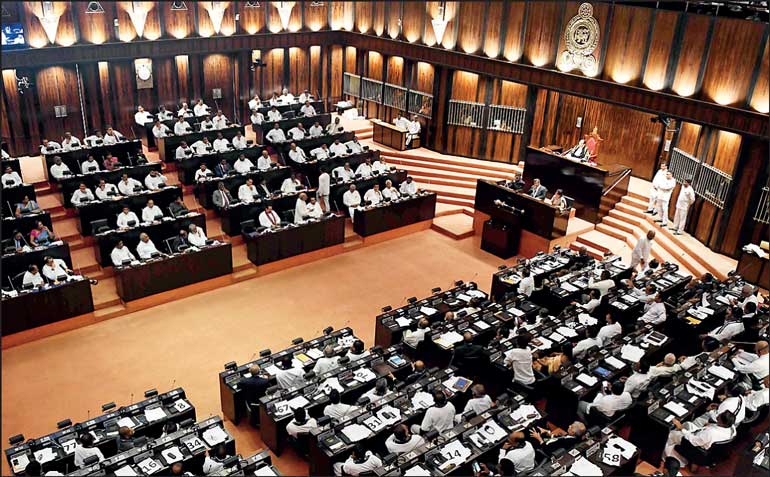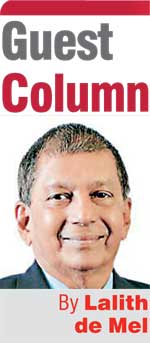Monday Feb 16, 2026
Monday Feb 16, 2026
Wednesday, 1 February 2023 00:00 - - {{hitsCtrl.values.hits}}

Can some leader pull together a team from those now in Parliament who have never been associated with bribery and corruption in any corrupt Government?

The tragedy in our country is that politicians have been making money and making decisions that will get them votes and not what is best for the country.
Victor Ivan’s excellent article written 12 years ago provides an interesting insight into bribery and corruption…
“The foundation of the political system of Sri Lanka is based on bribery or corruption. Power politics of Sri Lanka may be defined as the right to plunder public property. There is a competition among political parties to win that right for a limited period. The group that wins plunders public property to the maximum during its term of office. It distributes among its supporters some part of the wealth thus plundered. The system of institutions including the judiciary, also functions according to that inherent ideology. Such a system of institutions is required because of the necessity to pretend that the state is incorrupt although the official ideology is corrupt. The system of institutions including the judiciary, which are built to counter bribery or corruption, also gives the necessary protection to the corrupt practices of the ruling party in power. At the same time, implementation of the law against corrupt practices of the opponents of the ruling party helps to give the Government an anti-corruption appearance”.
“… The conclusion that can be arrived at in terms of these fundamental facts is that it is not possible to counter bribery or corruption that occurs in Sri Lanka, without doing away with the corruptness inherent in the political system, or without transforming the entire political system. What it means is that the enactment of new laws or establishment of institutions against bribery or corruption is futile.”
The ruling conglomerate
The primary objective of our ruling party politicians is to stay in power and enjoy the benefits of corruption. Consequently the yardstick for evaluating anything is whether it helps them to stay in power. Whilst in power the ruling party and its acolytes make money in a myriad ways. We now have in power a totally corrupt political group .That is the cause of our problems and is also the block that prevents us from cleaning up our Augean stables. Hercules cleaned the filthy stables of Augeas by turning the river Alpheus through them. Our river to clean the filth will have to be a new political leadership swept into power by a river of youth.
A recent issue will help to illustrate the problem of votes being the determining factor. To get a united Sri Lanka we must solve the Tamil problem. During the recent discussions they made two demands, namely to stop acquiring lands in the north and to release political prisoners. Both abundantly reasonable, but the Government is dragging its feet like it has done for a long time. The reason is obvious. They fear that giving in to these requests will upset Sinhala voters that keep them in power. It is all about staying in power. Doing what is good for the country comes a poor second.
Another thing they sing to keep them in power is that this is a Sinhala Buddhist country as opposed to being a country with the majority being Buddhists. In these desperate times with a shortage of foreign exchange they should remember, that the foreign currency we desperately need is brought in primarily by NON Sinhala Buddhists, and without the economic support from the non-Sinhala Buddhists we will never solve our economic crisis
Many facets of corruption
Corruption is not only about politicians making money. Some of the other types of corruption have become rampant recently in the RW era. We have seen corruption in the form of abuse of public power for political gain. All attempts to stop the Local Government elections is clearly corruption for political gains. Locking up those who criticise the President and his Government using the universally condemned PTA act is gross corruption.
We no longer have the economic strength to revel in corruption and not do what is necessary to drive growth because it may impact the vote base.
The way ahead
We need first of all a new set of political leaders whose hands are clean, and have never been stained by bribery, and are not guilty of corruption through abuse of power. Can some leader pull together a team from those now in Parliament who have never been associated with bribery and corruption in any corrupt Government? That may leave only backbenchers languishing in obscurity because they were not ardent supporters of those in power. Perhaps there is enough talent in the Opposition and backbenchers to form a new team. If this is not possible a new election is the only answer to get a new Government with people untainted by bribery and corruption.
The large debt
We have a problem of large debts and we have the problem of sustaining the economy.
The Rajapaksas are responsible for the large Chinese debt. These projects financed with dollar loans were never going to generate a dollar income to enable us to pay the capital and interest. In addition they were not generating a rupee income to get a pay back in rupees. Mahinda Rajapaksa was clearly seduced by the Chinese to accept their unsolicited tenders. If we set aside a theory that he was bribed by China, then he did it because it would enhance his image with the voters. But these projects were of vital importance to China as a part of their belt and road project, to protect the sea route of getting oil to China. (China has no oil) These loans are clearly ‘odious’ loans!
This is a concept that goes back a long time. If a lender gives a loan to get a benefit for themselves and is of no benefit to the country that took the debt it is an odious debt and there is no obligation to repay it. We must take a robust stand and refuse to pay. When China understands that they are in a vulnerable position we should come up with a more palatable alternative. We should ask them for a fresh loan which we will use to pay the current loan. No admission of odious loans, no right off in their books and so a good way out. It is an elegant solution. In return we ask for a 50-year period of grace before loan and interest payments commence. Perhaps after a bit of haggling we could settle for a 25-year period.
The way forward
If we can shed the debt issue, we have a strong economic hand. We have a strong export sector. In addition to the traditional exports of tea, rubber and coconut products, we have a large number of strong exports like apparel, rubber tyres, electrical items, cables, gems, spices, fish, and a host of smaller exports with good potential. Last year the exports were 13 billion. (The IMF offering is a little under 3 billion). Looking ahead tourism is the star in our portfolio of sources of foreign exchange. We see that Thailand has 40 million and Malaysia 30 odd million tourists so the potential is there and tourism can make us a prosperous country.
In the short term for say two years until we build a small buffer of foreign exchange we should ruthlessly save foreign exchange. No teams except cricket to be sent abroad. No foreign exchange for new students wanting to study abroad (ample opportunities for higher studies here). No foreign exchange for overseas holiday travel.
Ban imports of all non-essential items and products for which locally made substitutes are available.
No capital projects and don’t restart capital projects on hold when the IMF funds are received.
Look for outside collaboration to develop our mineral resources, a vastly neglected sector.
Look for outside collaboration to explore potential for oil and gas. Disband promptly the local unit that has been a significant cost for years with no results.
Sell the loss-making State enterprises after a mammoth campaign to explain to the public the losses made by these enterprises, and the huge savings to the Government if they are sold.
Sell some of the silver as well!
Sell one bank.
Sell unutilised State-owned land and land/estates acquired under the land reform act.
Stop recruitment to the public sector and meaningfully redeploy the surplus staff. Stop employing retired military officers (and paying them a double salary) as they have no experience in performing roles in the civilian sector.
Progressively reduce the spend on the armed forces by 50% of the current level.
The above are merely illustrative of the simple things we can do to revive the economy.